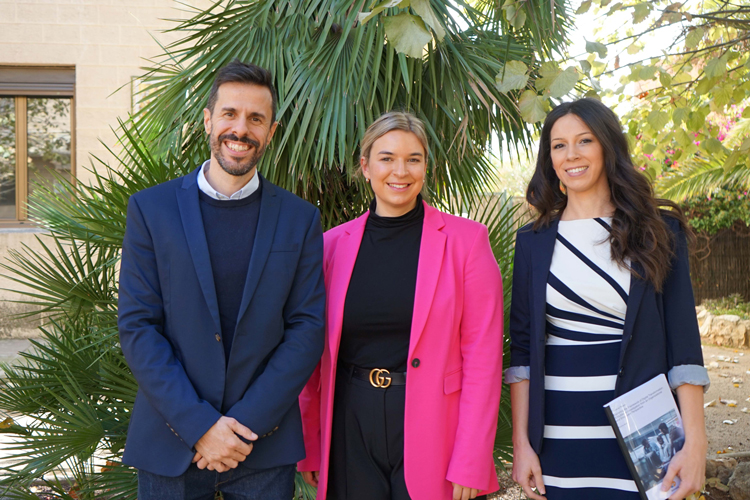In her doctoral thesis, Dr. Pauline Weritz has explored the framework of digital transformation of companies from a ‘multi-level’ perspective, providing empirical evidence on possible indicators of prediction and consequences of digital transformation.

Dr. Jorge Matute, Dra. Pauline Weritz and Dra. Jessica Braojos.
Digital technologies are revolutionizing industries, organizations and individuals around the world. At the same time, new opportunities and threats are emerging for organizations that require strategic and behavioural responses.
How does the phenomenon of digital transformation impact organizations and employees in a disruptive environment? In a global economic situation, the digital environment is constantly changing, generating uncertainties and the need for change strategies in digital areas to maintain companies' competitiveness and attract employees. In addition, the recent pandemic and digital opportunities have led to a rapid digital transformation of workplaces, affecting employees.
In this context, Dr. Pauline Weritz recently defended her Ph.D. thesis Exploring the Framework of Digital Transformation: A Multilevel Investigation from an Organizational and Employee Perspective, co-directed by Dr. Jorge Matute and Dr. Jessica Braojos, professors at IQS School of Management.
The main objective was to explore the framework of digital transformation from a multi-level perspective, both from an organizational and employee level, to provide empirical evidence on possible predictors and consequences of a successful digital transformation of companies.
A framework for a successful digital transformation
The research has focused on three main avenues:
- Shaping a framework for ensuring a successful digital transformation of companies based on organizational resources.
- Introducing employee experience and emphasizing the digital culture of organizations.
- Addressing the digital transformation of the workplace and closing the digital transformation framework gap.
To achieve the objectives of this research, specific studies were conducted with nine multinational companies, a quantitative study with survey data from the company and IT department managers, complemented by quantitative research on digital workplace transformation, to follow a generalizable approach. The findings of these studies indicate that dynamic capabilities and digital cultural values drive the success of digital transformation.
Further quantitative analysis reinforced the role of digital transformation, showing that this transformation further enhances firm performance, leading to employee organizational engagement when the relationship is mediated by digital leadership and continuous learning.
Finally, the research has conducted a forward-looking study, highlighting the importance of critical skills in the digital workplace and employee preferences for the hybrid workplace.
As an overall conclusion, Dr. Weritz's research explored the framework and success of digital transformation, pointing to critical enablers such as dynamic capabilities and digital cultural values, digital leadership and continuous learning, new insights into critical skills in the digital workplace, and the relevance of a hybrid workplace for the future of work.
Related publications
- Weritz, Pauline; Matute, Jorge; Braojos, Jessica; and Kane, Jerry, "How Much Digital is Too Much? A Study on Employees’ Hybrid Workplace Preferences" (2022). ICIS 2022 Proceedings. 3.
- Weritz, Pauline; Braojos, Jessica; and Matute, Jorge, "Exploring the Antecedents of Digital Transformation: Dynamic Capabilities and Digital Culture Aspects to Achieve Digital Maturity" (2020). AMCIS 2020 Proceedings. 22.
- Weritz, Pauline; ‘Hey Leaders, It’s Time to Train the Workforce: Critical Skills in the Digital Workplace’, Adm. Sci. 2022, 12(3), 94
This thesis has been funded through the IQS Grants programme for doctoral theses, and through the project ‘Managing dynamic business capabilities and individual employee skills in a disruptive era’ (ACM2021_05), under the Aristos Campus Mundus program.










